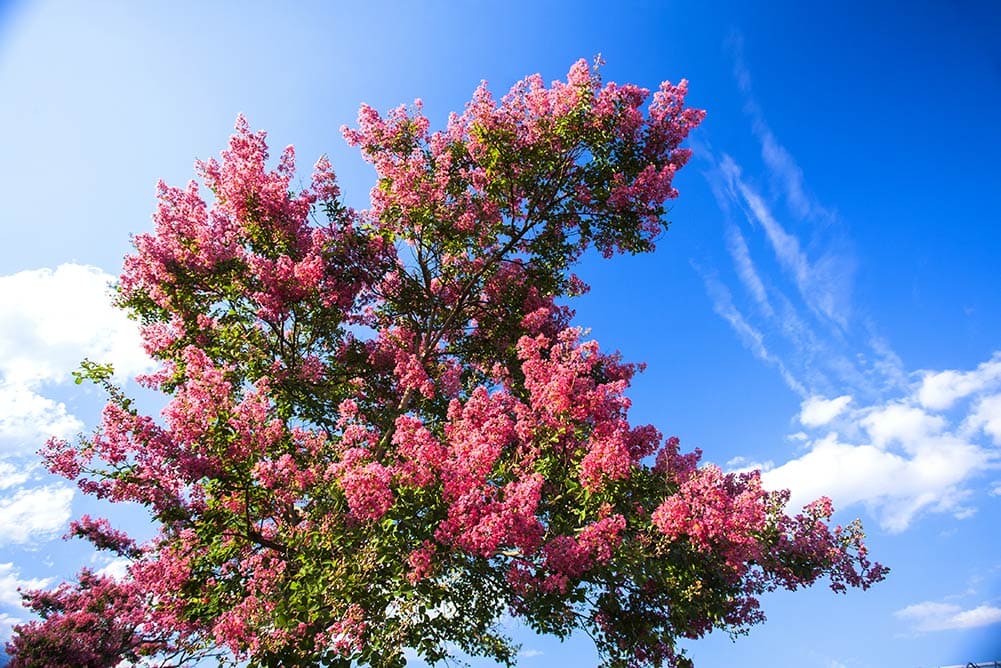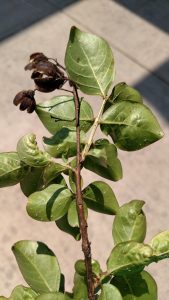
See all posts by this author
Crape myrtle aphids are pests that specifically target crape myrtle trees. These small, pear-shaped insects suck sap from the leaves, leading to curled, yellowed foliage. Aphids also excrete a sugary substance called honeydew, which can attract ants and promote the growth of black sooty mold, detracting from the tree’s appearance.
Of course, prevention and treatment for crape myrtle aphids is included in a Plant Health Care subscription from Arborscapes. (As are myriad other pests and diseases) If you would like to become a part of our Plant Health Care program, reach out to Arborscapes today! Your living landscape will be the envy of the entire neighborhood!
Here’s a guide on managing and treating crape myrtle aphids in the Charlotte area:
Physical and Cultural Controls:
- Water Spray: A strong jet of water from a garden hose can dislodge aphids from plants. This is a non-toxic method and can be especially effective for light infestations.
- Pruning: If you notice specific branches or parts of the tree heavily infested, prune and dispose of these parts to reduce the aphid population.
- Healthy Trees: Ensure that your crape myrtles are in good health. Aphids often target stressed plants, so regular watering and balanced fertilization can help.
Biological Control:
- Ladybugs: These are natural predators of aphids. Releasing ladybugs in your garden can help control aphid populations.
- Lacewings: Another natural predator, lacewing larvae feed voraciously on aphids.
- Parasitic Wasps: Tiny parasitic wasps lay their eggs inside aphids. The developing wasp larvae consume the aphid from the inside, eventually killing it.
- Avoid Broad-spectrum Insecticides: These can kill the beneficial insects that naturally control aphid populations.
Insecticidal Treatments:
- Insecticidal Soaps: These can be effective against aphids without being harmful to beneficial insects. They need to be applied thoroughly, covering all infested surfaces. Repeat treatments might be necessary.
- Horticultural Oils: Such as neem oil, can smother and kill aphids. As with soaps, thorough coverage is essential.
- Systemic Insecticides: Products containing imidacloprid can be applied as soil drenches, providing protection against aphids for several weeks. However, they might also impact beneficial insects and pollinators, so use them judiciously.
- Contact Insecticides: Products with pyrethrins can be used, but they may also affect beneficial insects.
Regular Monitoring:
- Regularly inspect your crape myrtles for signs of aphids or sooty mold. Early detection and intervention are crucial for effective management.
Avoid Over-fertilization:
- Excess nitrogen can promote lush, tender growth that aphids prefer. Use a balanced, slow-release fertilizer.
Remember always to read and follow label instructions when applying any insecticides. Also, consider the potential impacts on beneficial insects, pollinators, and the surrounding environment. A combination of cultural, biological, and chemical treatments will offer the most effective control against aphids.
And if all of this sounds like too much work, contact Arborscapes to subscribe to our Plant Health Care program, and we will take care of this, other pests, fertilization and health concerns for your living landscape!
See all posts by this author

